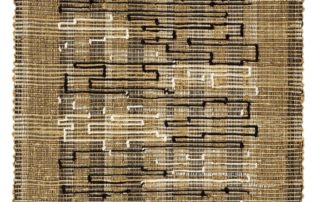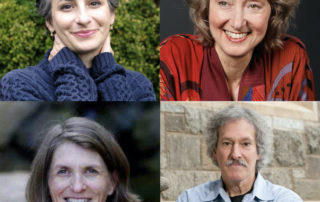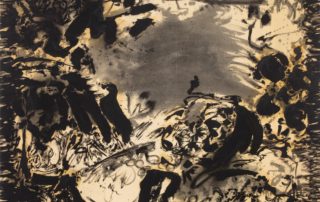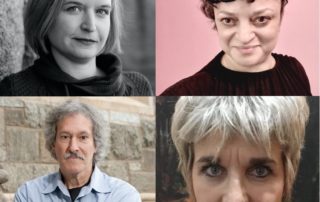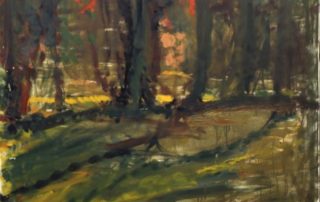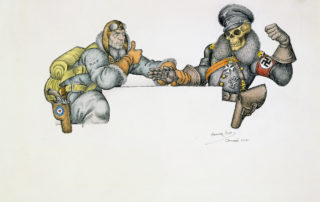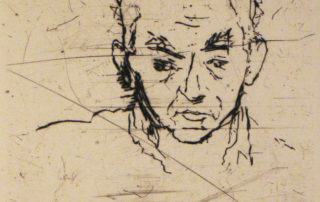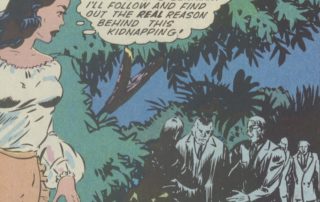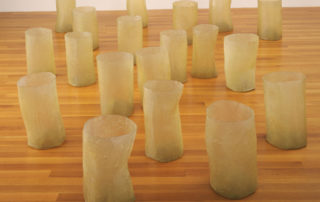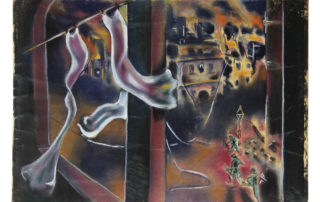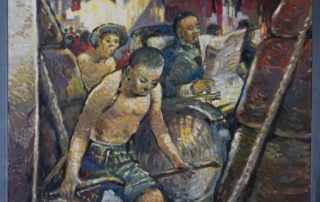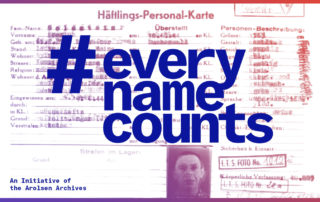Rachel Stern2022-08-26T05:17:58-04:00October 14th, 2021|Events, Lectures, Past Events|
Anni Albers (Berlin 1899 – 1994 Orange, CT) found her artistic identity at the renowned Bauhaus--but not where she expected to. The gender-restrictive conditions at the school pushed her to textile work. As the Nazis forced the Bauhaus closure, Anni and her already well-known husband, Joseph Albers, immigrated to the United States, where Joseph and later Anni were invited to teach at Black Mountain College in North Carolina. From there to New York and Yale University, while her husband gained renown as a teacher and practitioner of painting, Anni expanded her presence as an innovator in diverse textile media and styles, shaping a far-flung, influential career that resonates to this day. The United States presented Albers with new [...]
Rachel Stern2022-08-26T05:12:16-04:00October 14th, 2021|Events, Lectures, Past Events|
What is it that defines human identity? DNA? Language? Culture? Landscape? Polity? Or is it a combination of all of these factors? How do the sources of identity make it easy or difficult for individuals who migrate from one location to another—by choice or under duress—not merely to adapt but to become fully comfortable within their new home? In this brief Zoom Conference, an interdisciplinary panel of experts considers how identity is shaped by our genomic make-up; how it is affected by the migration from home to new and different dwelling places; and how, in particular, migrational shifts can affect artists and their creative process. Expert Panel: Libby Copeland, Award-winning journalist and author Ori Z Soltes, Teaching Professor at Georgetown [...]
Rachel Stern2022-08-26T05:20:00-04:00October 8th, 2021|Events, Lectures, Past Events|
In a prolific career that spanned nearly five decades, Friedel Dzubas (b. Berlin, 1915–d. 1994, Newton, Mass.) articulated his mature style by the 1970s, creating a striking visual language from counterpoised abstract shapes of brushed color that he juxtaposed, overlapped, and opened to reveal his gessoed grounds. Yet, in prior years, Dzubas’s early work in Berlin were influenced by Expressionist artist of the two primary groups known as Die Brücke and Die Blaue Reiter. As Dzubas told curator Charles Millard in 1982, “Their unheard-of brashness of color; that was really brave. That was very exciting. Color’s an emotional thing. These people not only spoke directly; they felt deeply. There was passion.” His early pen and ink watercolors embed the [...]
Rachel Stern2022-08-26T05:07:57-04:00October 7th, 2021|Events, Lectures, Past Events|
Shaped in accordance with the theme of the current Fritz Ascher Society online project, "Identity, Art and Migration," this brief conference focusses on psychological, historical and art historical aspects of migration—broadly and in particular within the context of artists seeking refuge in the United States during the Holocaust. Expert Panel: Rebecca Erbelding, PhD, USHMM historian in Washington DC Katya Grokhovsky, artist and founder of The Immigrant Artist Biennal in New York NY and Ori Z Soltes, PhD, Teaching Professor at Georgetown University in Washington DC These diverse experts will address the specifics of American immigration policies in the first half of the twentieth century and how they particularly affected those seeking refuge from the ravages [...]
Rachel Stern2022-08-26T05:10:27-04:00October 6th, 2021|Events, Lectures, Past Events|
Fritz Ascher (Berlin 1893 - 1970 Berlin) almost made it out of Germany as the persecution of the Jews was developing. SINCE HE HAD been arrested and released from concentration camp and prison after several months, friends managed to book passage on a ship to Shanghai, but the German Nazi bureaucracy refused to let him leave the country. Ascher found refuge in the basement of his deceased mother's friend, Martha Grassmann--in a house located in the Grunewald, the heart of the Nazi brass residential neighborhood in Berlin. In hiding--an interior migration--he shifted from vibrantly expressionist paintings and drawings to dense poetry. AFTER the war he emerged to a Germany very different from the one he had known before and [...]
Rachel Stern2022-08-26T05:14:46-04:00October 6th, 2021|Events, Lectures, Past Events|
Prior to World War II, Polish-born Arthur Szyk (Lodz 1894 – 1951 New Canaan, CT) was best known for his ornately detailed renderings of historical subjects and Jewish themes. But after the German invasion of Poland in September 1939, he gained the accolades of international audiences for his biting caricatures of Nazi leaders and his efforts to garner support for the Allied cause and Europe’s persecuted Jews. In 1940, Szyk took his mighty pen to the United States, where he quickly became a popular artistic sensation. His images graced the covers and inside pages of leading magazines, like Time, Colliers, Esquire, Look, The American Mercury, Coronet, and Liberty. Szyk’s cartoons regularly appeared in The New York Post, The Chicago [...]
Rachel Stern2022-08-26T05:28:17-04:00October 6th, 2021|Events, Lectures, Past Events|
Rudi Lesser, a graphic artist already gaining significant recognition in his twenties in Germany, survived the Holocaust in Scandinavia. Interestingly, he immigrated to the US just after the war, in 1946, and although achieving success in New York--and as the founder of the graphic arts department at Howard University in Washington, DC--never felt at home here. He returned to a different Germany, in 1957, where he lived in relative poverty and obscurity--but apparent contentment--for the remaining thirty years of his long life. Lesser was one of over 10 Jewish refugee professors at Howard University and among the more than 60 at Black colleges, primarily in the South. Like other Jewish and white progressives and liberals of his era, [...]
Rachel Stern2022-08-26T04:58:17-04:00October 6th, 2021|Events, Lectures, Past Events|
Born 1921 in Vienna, Lily Renée Willheim led a sheltered and cultured life until the age of 17 when she had to flee from the Nazi powers, first to England, then to New York. By accident and because of her artistic talent, she became one of the leading cartoonists during World War Two, creating artwork in which anti-fascist messages were as important as aesthetic considerations. For many decades after the end of the war, she continued to work creatively in various art forms. Image above: Detail of Lily Renée, Title Page, Femforce Good Girl art quarterly, reprint, summer 1991 © Lily Renée In their presentations, Sabine Apostolo and Michael [...]
Rachel Stern2022-08-26T05:30:27-04:00October 6th, 2021|Events, Lectures, Past Events|
Eva Hesse arrived to the United States as a 3-year-old, was raised in a community largely of Holocaust survivors, and by her Twenties was a rising star on the New York art scene, contributing a unique voice to the shaping of post-Abstract Expressionist art. A key turning point in her innovative art was a return visit to Germany on an artist fellowship. How do we understand the work of this brilliant figure whose life suddenly ended, from brain cancer, at the age of 34? She was born into an observant Jewish family in Hamburg, in a Germany being devoured by the Nazis. She and her older sister Helen were sent to the Netherlands in 1938—when she was not [...]
Rachel Stern2022-02-06T07:18:15-05:00September 14th, 2021|Events, Lectures, Past Events|
In Claude Lanzmann’s seminal nine-and-a-half-hour film SHOAH, he chose not to use any images of the Holocaust, telling the story instead solely through the words of witnesses. By contrast, art historian Georges Didi-Huberman and contemporary artist Gerhard Richter have both emphasized the power of images to reflect and educate—the former in his book Images in Spite of All: Four Photographs from Auschwitz, and the latter in a series of paintings titled “Birkenau.” Join the Museum of Jewish Heritage and the Fritz Ascher Society for a lecture exploring the tension between these different perspectives on images, words, and the Holocaust with German art historian and curator Eckhart Gillen. Gillen grounds the discussion in the example of Boris Lurie, the subject [...]
Rachel Stern2022-02-18T05:25:20-05:00May 11th, 2021|Events, Lectures, Past Events|
Presentation by Steven Less, PhD Senior research fellow emeritus of the Max Planck Institute for Comparative Public Law and International Law and son of the artist in Heidelberg (Germany) and Hannah-Lea Wasserfuhr PhD Candidate at the Center for Jewish Studies in Heidelberg, Heidelberg (Germany) Moderated by Rachel Stern Director and CEO of the Fritz Ascher Society in New York Born in Berlin, John Hans Less (1923 – 2011) fled to Shanghai in September 1940 as a 16-year-old together with his family to escape Nazi persecution. Largely dependent on relief organizations to survive, the Less family soon went through further disruptions when the Japanese occupied the city and later confined Jewish refugees to the Hongkew [...]
Rachel Stern2022-02-18T06:42:00-05:00May 11th, 2021|Events, Past Events|
Join the Fort Tryon Jewish Center (FTJC) and the Fritz Ascher Society for a LIVE DATA ENTRY EVENT to help build the world’s largest digital monument to victims of the Holocaust: the Arolsen Archives’ #everynamecounts. THIS EVENT WAS NOT RECORDED. Opening Remarks Rabbi Guy Austrian Fort Tryon Jewish Center in New York Rachel Stern Director and CEO of the Fritz Ascher Society in New York Introduction and Moderation Elizabeth Berkowitz Digital Interpretation Manager of the Fritz Ascher Society in New York #everynamecounts is a crowd-sourced data entry initiative to return the names of Holocaust victims, their families, and details of their lives into the findable, keyword-searchable public record. Participants enter information about Nazi victims and family members from digitized [...]


